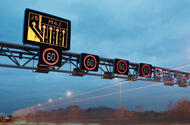Smart motorway speed limits could be unfairly penalising drivers

70,000 motorists were hit with speeding fines from smart motorways last yearRecord level of speeding fines suggests drivers don’t trust lowered speed limits
A record number of speeding fines accrued on sections of motorway with variable speed limits could suggest the limits are confusing motorists.
An investigation by The Times showed that more than 70,000 drivers were fined on motorways with variable speed limits last year. This tenfold increase compared with five years ago has led to suggestions that variable speed limits are unfairly operated.
Highways England, which operates the country’s motorway network, pre-emptively enforces lowered speed limits before congestion builds up. But a spokesman for the AA told Autocar that such a system is creating “distrust” and encourages speeding.
“It’s not surprising that drivers who see the ‘congestion ahead’ message but are the only car on the motorway don’t trust the lowered speed limit,” said the spokesman. “It’s because they’re unaware of how the system works. But, in their defence, how would they know?”
The UK’s smart motorway system uses radar technology so it can detect traffic levels on the road. If traffic builds up at a certain section, the system slows down approaching cars so that by the time they reach the point, it’s cleared or at least freer-moving.
Do we really want more smart motorways?
But the AA has asked Highways England to provide more information as to how quickly the system can react to changes because, as the spokesman explained, “there could be a delay that leaves lowered limits in place” even after congestion has cleared.
“Let’s have a review in the radar system,” the spokesman said. “Is there a time lag, has it been left on for an hour after that congestion has ended? We argue that if traffic is now free, let it flow.”
Variable speed limits are often enforced on smart motorways, where hard shoulder running is allowed during high traffic. But research obtained by the AA shows that many drivers are opting not to use the hard shoulder, which is labelled as Lane 1 on gantry signage, possibly because they are unsure if they can.
“Even Highways England has said that drivers aren’t using Lane 1 as much as they could be,” said the spokesman. “So if the smart motorway system is flawed, how does that tie in with Highways England’s ambition to introduce more of them?”
Ongoing upgrades to the M4 motorway have also brought safety into the spotlight, following Highways England’s decision not to increase the number of emergency rest areas, despite a recent agreement with parliament.
Highways England said the upgrade, which will cover 32 miles between junction 3 (Hayes) and 12 (Theale) in a five-year project costing up to £862 million and due to finish in 2022, is already under way and so can’t be changed in this way.
More content:
German-built Skoda Karoq to hit market while brand upgrades Czech plant
Comments
Post a Comment